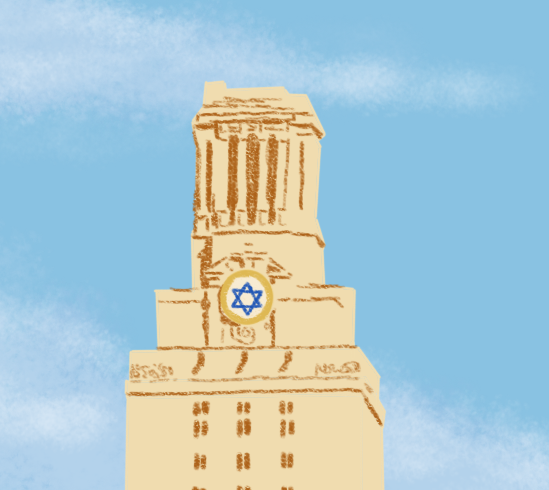Jewish students discuss community, faith, observing Passover at UT
April 12, 2023
As Emily Kolach and Bindi Kaplan found themselves sharing childhood memories and familial traditions with their Jewish peers on campus, they simultaneously fortified new connections and adopted new customs.
For students like Kolach and Kaplan, this year’s Passover celebrations marked their first time celebrating the holiday away from home.
“It’s been nice having Jewish friends on campus who are going through the same stuff,” Kaplan said. “It was cool going to Hillel and seeing a lot of Jews that I hadn’t seen before.”
On April 5, students across campus gathered for a Seder — a Jewish ritual feast held on the eve of the 15th day of the Hebrew month of Nisan. The feast entails retellings of the story of the Israelites’ liberation from slavery in Egypt. Texas Hillel, a student-run Jewish organization at UT, held a first night Seder at their foundation’s location on San Antonio Street, uniting students on campus through an inclusive conduction of the feast.
“Hillel does a great job of emulating that feeling of community and home by (grouping) you with new people, and using songs and prayers from our home communities,” humanities sophomore Lila Katz said. “It’s what the students want to make of it, which is why it can feel so close to home.”
During Passover, Jewish people traditionally consume strictly unleavened bread, signifying the virtue of sacrifice prioritized in the exodus of the Israelities. Kaplan, a sociology freshman, said she found adhering to tradition as a college student difficult due to the lack of options available in the dining hall.
“It’s interesting when there’s food in the dining hall that I’d normally be excited to eat, (but) I can’t eat it,” Kaplan said. “I just pretend it’s not there and eat whatever I can scavenge.”
Kaplan said attending the Seder presented the opportunity to eat various foods from her upbringing, including Matzah.
Jewish students across campus will close out the eighth day of Passover at sundown on April 13. Kolach, a neuroscience freshman, said observing the holiday and her religion overall at UT introduced an entirely different community into her life, illuminating her to the various Jewish experiences on campus.
“It’s been really nice to be able to share that experience with so many amazing people,” Kolach said. “I’m seeing how different people think of Judaism, (for example) whether they’re secular or Ashkenazi. … It’s just a very diverse group.”
Passover serves as an opportunity to reflect on the oppression Jewish people face. Katz said Texas Hillel made an effort to hold a more progressive Seder, one that acknowledges acts of oppression from the past and present.
“There were paragraphs (in the Seder) about current wars going on and conflicts about people who are in modern-day slavery,” Katz said. “I just appreciate that effort. … They’re trying to repair the world we’re living in now.”
This time of year allows students to share their cultural practices with their non-Jewish peers and spread their pride for their Jewish identities, Kaplan said.
“It’s been cool going to University and talking about being Jewish with people,” Kaplan said. “It’s one of my cultural markers, something that impacts my life a lot.”
Community lies at the heart of the holiday. While many students’ memories associated with the holiday reside in their familial ties, Kolach said, on-campus Passover celebrations give students the opportunity to develop an independent religious identity, rich in community and culture.
“(Passover) is a connection to my family, especially being away from them,” Kolach said. “It’s nice to have something that connects me to not just my parents, but also to a whole cultural history.”



